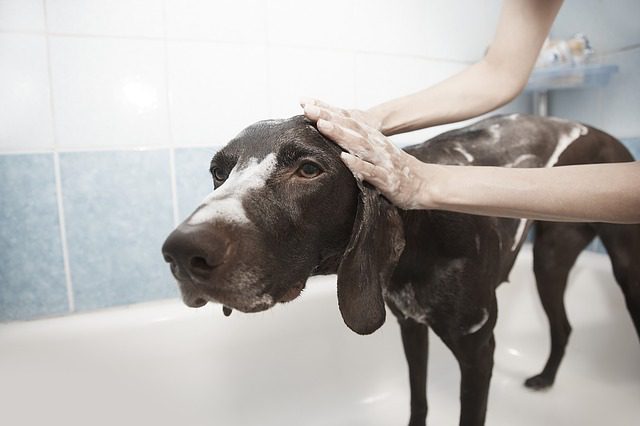
by Taryn Clark, DVM
It is not at all unusual for dogs to have seasonal allergies. Dogs are commonly allergic to grasses, weeds, pollen, mold, dander, insects, trees and other environmental pollutants. Environmental allergens can appear certain times of the year, even in the winter, depending on the individual dog. Late summer/early fall is a particularly bad time of year for allergies in our canine companions.
Common symptoms of dogs with seasonal allergies
There are numerous possible signs of seasonal allergies in dogs, though of course not all dogs will exhibit all symptoms.
Watch out for:
- Itching/scratching/biting/chewing various parts of their body (feet, belly, armpits, face, etc.)
- Sneezing/reverse sneezing
- Red, itchy eyes/facial rubbing
- Scooting and licking of the anal area
- Swollen or sore paws
- Possible respiratory issues (bronchitis or asthma)
- Hair loss and increased shedding
- Hives or bumps and/or redness and inflammation of their skin
- Scabbing and crusting on various parts of their bodies which generally means a secondary infection
- Ear infections/ear flapping with or without smell or discharge
The video quality may not be great, but this is a great example of the reverse sneeze
Some easy things to try at home
There are a number of actions and strategies that you can start using right now with your dog to lessen the severity of seasonal allergies.
Avoid walking your dog in the early morning or late afternoon, when pollen counts are the highest. Try to steer clear of open fields and parks where the offending plants/pollens may originate. When coming in from outside, wipe your dog’s feet with hypoallergenic baby wipes, or have a foot bath next to the door.
Clean bedding regularly, and vacuum your floors frequently. Running air filters, dehumidifiers and air conditioning may help improve indoor air quality.
Increasing bathing to up to twice weekly with a gentle, oatmeal based shampoo may help reduce the contact time of the allergens on the skin. Leave on conditioners or rinses that are anti-itch. Fish oil supplementation in high doses can act as an anti-inflammatory/antioxidant for the skin.

Some dogs with seasonal allergies will benefit from more frequent bathing.
Anti-itch sprays or creams may be helpful, and be sure to use monthly flea preventives.
It’s a good idea to visit your veterinarian if you notice the following in your pet:
- Is not comfortable
- Has an odor to the skin
- Cannot stop itching and scratching
- Hair loss, skin lesions and/or ear infection
How your veterinarian can help
There are various things a veterinarian can prescribe to help dogs with seasonal allergies. Medicated shampoos and rinses may help with skin conditions and discomfort. Other things may be prescribed, as required:
- Antihistamines/steroids
- Cytopoint (injectable)/Apoquel (oral)
- Antibiotics/antifungals
- Topical sprays/creams
- Ear medications (short and long acting)
- Immunotherapy (oral or subcutaneous)
- Food therapy
Recent Posts
About Us
Ann Arbor Animal Hospital is a locally-owned animal hospital operating for over 90 years in Ann Arbor, MI.
